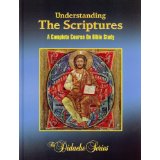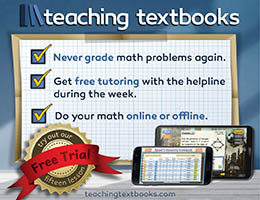The Didache Series, first published in 2003, immediately raised the bar for Catholic religion texts for high schools and colleges. The series began with four rather large textbooks, ranging in size from 400 to 832 pages, each a year-long course. These are gorgeous books, heavily illustrated in full color with religious art, maps, and photos.
Titles of the four original texts are Introduction to Catholicism, Understanding the Scriptures, The History of the Church, and Our Moral Life in Christ. Even though the content is challenging, Catholic homeschoolers have found these to be well-written, magisterium-faithful courses that work well for home education. Many Catholic high schools as well as colleges and universities have also adopted them, and adults have purchased them for personal use. However, in 2007, the USCCB approved a new curriculum framework for high school level that all Catholic schools are to follow. In this new framework, six semesters have designated topics while elective options are given for the other two semesters. The framework requires coverage of these topics:
I.The Revelation of Jesus Christ in Scripture
II. Who Is Jesus Christ?
III. The Mission of Jesus Christ (The Paschal Mystery)
IV. Jesus Christ's Mission Continues in the Church
V. Sacraments as Privileged Encounters with Jesus Christ
VI. Life in Jesus Christ
Optional electives are:
Option A. Sacred Scripture
Option B. History of the Catholic Church
Option C. Living as a Disciple of Jesus Christ in Society
Option D. Responding to the Call of Jesus Christ
Option E. Ecumenical and Interreligious Issues
Since the original Didache courses covered most of both the required and optional topics, the publisher decided to begin by first rearranging the content of the original books. Then they added what was required to fill in the gaps. The result is a series of semester-long courses that align with the Bishops' USCCB curriculum framework. Titles of the semester textbooks are:
Faith and Revelation: Knowing God through Sacred Scripture (available in either English or Spanish)
The Blessed Trinity and Our Christian Vocation
The Mystery of Redemption and Christian Discipleship
The Church: The Sacrament of Salvation
The Sacraments: Source of Our Life in Christ
Our Moral Life in Christ (Semester Edition)
Understanding the Scriptures (Semester edition)
The History of the church (Semester edition)
The Social Doctrine of the Catholic Church (satisfies elective C)
Ecumenism and Interreligious Dialogue
The first six of these titles cover the required topics while the last four reflect elective options. Note that while titles of three books in each series are the same or similar, there is a drastic difference in the size of the books. Semester-course texts are about 250-350 pages each. The original books are called “Complete Courses” while the new ones are “Semester Courses.” The semester courses should be manageable for the average student although they still have more content than most other religion courses. Students should be covering two texts per school year. Keep in mind that these are very heavily illustrated texts, so the amount of reading is not overwhelming.
Student workbooks and teacher's manuals are available for all textbooks from both series. Workbooks require students to answer questions in many different formats. Answers to workbook questions are in the teacher's manuals.
All texts draw on Scripture, the Catechism, Church Fathers, and Church documents, frequently quoting from these sources. The semester-course books have discussion questions at the beginning of each chapter and “study” questions and “practical” questions at the end of chapters. Study questions might be done independently but other questions are really meant for discussion or other activities. Vocabulary lists and catechism paragraphs referenced in each chapter are also handy at the end of each chapter.
In both semester- and year-long courses, a few pages of “Supplementary Reading” at the end of each chapter bring in primary source material related to the topic which enhances the chapter content and helps familiarize students with resources such as encyclicals, writings of the Church Fathers and saints, documents from church councils, and other historical documents.
Teacher's manuals feature reduced reproductions of student text pages, lesson plans, additional instructional material, tests, quizzes, vocabulary reviews, answers to study, responses for practical exercises, suggestions for long-term assignments, teaching tips, and a collection of prayers and devotions. Teacher's manuals also include a CD with printable tests, quizzes, and vocabulary review.
I'll add a few notes on particular textbooks I received for review.
Understanding the Scriptures (Complete Course) was written by well-known author Dr. Scott Hahn. This text reflects a love and respect for the Bible missing in so many Catholic texts. Many other texts give lip service to Church teaching on the inspiration and inerrancy of Scripture then discuss the Bible as if it is no different than other historical books. They seem to have bought into the idea that Scripture is little more than culturally-limited material shaped by human whim. On the other hand, Dr. Hahn sees the Divine mind in Scripture and reads the whole as a story of God's relationship with man through a series of covenants. He addresses the Documentary Hypothesis (J, E, D, and P sources for the Old Testament), pointing out that attempts to identify sources such as these are no more than “scholarly conjecture and speculation.” (Those who want to explore this topic more deeply can use resources in the teacher manual.) This book also has an excellent (but brief) treatment on the question of Creation and Evolution in relation to Church teaching. Dr. Hahn points out key truths from the book of Genesis that Catholics are required to believe relating to Adam and Eve and original sin. Then he points out the potential conflict with evolutionary teaching that includes the concept of polygenism which denies that all people are descended from Adam and Eve. Treatment of important points such as these makes this a text that is faithful to Church teaching while also satisfying those seeking rational understanding. It doesn't answer all the difficult questions, but it points out key points to consider.
The History the Church (complete course), at 816 pages, can actually be used for credits in both religion and history. Since it begins with study of the origins of the Roman world and continues up through the twentieth century, this might also be considered a world history text focused on western civilization. This is a “heavy-duty” text that would almost be more suitable for college than high school. The content is not difficult, but there is a lot of information to absorb. For example, an entire chapter is dedicated to “The Crusades, Military Orders, and the Inquisition,” providing a far more nuanced understanding of all three topics than we find in most other texts. For the dedicated student, this is a fabulous study of the development of Christianity grounded in history.
The semester course, The Blessed Trinity and our Christian Vocation, begins with a discussion of faith and revelation, although “faith and reason” might be an apt description of this first chapter since it is an excellent presentation of the big questions young people have to address regarding their beliefs. The second chapter is an overview of the Trinity, then the next four chapters are dedicated to the persons of the Trinity with two chapters on Jesus, one on His nature and the other on His life and teachings. The last chapter is on the Blessed Virgin Mary.
The Sacraments: Source of Our Life in Christ covers material originally in the complete course, Introduction to Catholicism. This book culminates with a final chapter on liturgy that covers the liturgical year, sacramental, prayers, statues, icons, pilgrimages, and other topics related to Catholic worship.
The four complete courses in the Didache series are also available online through My Catholic Faith Delivered™. Online courses have all of the text content including illustrations. They also add interactive vocabulary lists and "flash cards" for study. Pre- and post-tests are scored and tracked by the computer. Some prayers with slide shows are included. The courses work in a fashion similar to the Faith and Life online courses that are also available at My Catholic Faith Delivered, so please read that review for more information on course delivery. Teacher's manuals and student workbooks are not included for the online courses. The pre- and post-tests in the online courses offer a minimal level of accountability. There are study questions online for each chapter that do not include any mechanism for answering online; parents could ask students to write out answers to these questions, but they would not have access to an answer key. "Practical Exercises" that are included in both print and online courses ask questions that have to do with practical applications. For example, one such question from chapter 14 in Understanding the Scriptures discusses the story of Belshazzar and his sacrilegious use of the temple vessels. It goes on to ask, "What are some ways we can show more respect for God in our dress and behavior when we receive Holy Communion?" These practical questions might be used for discussion or essay responses. Many parents might feel that this selection of opportunities for student responses is sufficient without workbooks or tests.
Online courses are almost half the cost of the student text alone, so I know this option will appeal to many families. Some families might choose to purchase the printed teacher's manual and student workbook and use those with the online course.
Parish Editions
In 2012, Midwest Theological Forum began producing yet another version of the Didache series, the Parish Editions. Parish Editions draw on much of the same content that is used in other books, but it is rearranged and rewritten to some extent in a condensed fashion. These softcover books are about half the length of the semester courses described above. Illustrations take up less space although these books are still replete with beautiful, full-color illustrations.
Free answer keys are available through the publisher's website, but there are no separate teacher guides or student workbooks. Instead, the key ideas, vocabulary words, activity suggestions, focus questions, "guided exercises" (that generally involve thinking, discussing with a partner, and sharing conclusions, sometimes with a written component), closure assignments (written assignments that might serve as end-of-chapter assessments), and alternative assessment suggestions are in the margins of each page. Discussion questions are at the end of each chapter.
The fact that these books are self contained and cost only $14 makes them a much more affordable option than the others I've described. While each book was originally intended for semester-long courses for adults that might be offered at the parish level, they are still substantial enough for homeschoolers to use, completing two books for a year's coursework.
The content and questions are on the same level as the other books. This is suitable for homeschoolers using the books for courses. However, the level of the content and questions is likely to be more demanding than the average parishioner prefers; courses are likely to attract only those adults willing to put in significant time and effort. However, adults might also choose to read these books on their own rather than as course requirements; in this case they can skip questions or work they would rather not do but still learn what they wish.
Eight courses are available in Parish Editions: The Blessed Trinity and Our Christian Vocation, Faith and Revelation: Knowing God Through Sacred Scripture, The Church: Sacrament of Salvation, Sacraments Source of our Life in Christ, Our Moral Life in Christ, Understanding the Scriptures, The History of the Church, and The Mystery of Redemption and Christian Discipleship.
I suspect that the low cost and self-contained format of the Parish Editions will quickly make them a very popular choice for homeschoolers.
Introduction to Catholicism for Adults
Adults might be interested in reading the Didache series texts for self-study or parish groups, but sometimes they don't want to wade through a series of textbooks. Introduction to Catholicism for Adults is a fabulous resource for those who want to study an overview of their faith at more than on introductory level in a single book.
The content is more comprehensive than the Didache student course of the same title. Published in either hard or soft cover, the Introduction to Catholicism for Adults is 6" x 9" rather than the larger 8.5" x 11" format of all of the other books. The page count is 984 pages. It is similar in size to the Catechism of the Catholic Church. It actually parallels much of the content of the Catechism but is much easier to read. The book is printed in black and white with far fewer illustrations than the other Didache textbooks, but it does have sidebars and a few visual elements. Chapters conclude with questions, practical exercises (e.g., additional reading, research, essay writing), and pertinent quotes from the Catechism. While it obviously does not contain all of the content of the Catechism, the most important paragraphs are included for each topic.
The first chapter, "Called to Holiness" sets the stage for the rest of the book as it discusses our spiritual calling. It follows a logical progression from there discussing the existence of God, divine revelation, the trinity and the nature of God, creation, man, original sin, Jesus Christ, the Paschal Mystery, the Holy Spirit, the Catholic Church, the resurrection of the body and everlasting life, Christian prayer, the sacraments (with extensive coverage of each one), morality, grace, virtues, free will, the Ten Commandments, the Beatitudes, and the person in relation to society.
A substantial glossary and an index are at the end of the book. Footnotes throughout the book cross reference to Scripture, church documents and other sources in a fashion similar to the Catechism. Unfortunately, there is no answer key available at this time.
Introduction to Catholicism for Adults should be an excellent resource for parish classes. While it could be used for RCIA or Adult Confirmation sessions, it might be too intimidating for some participants. (Assigning selected sections for reading rather than the entire book might be a practical way to use it in those settings.) I think the ideal audience is likely to be those who have at least a year, but more likely two years, to work through the chapters, taking time to discuss and apply what they are learning.










